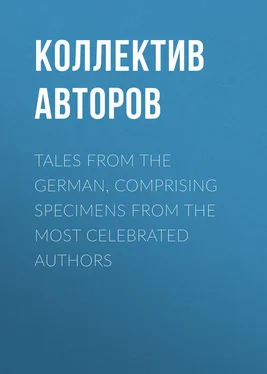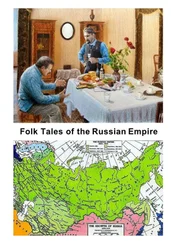Коллектив авторов - Tales from the German, Comprising specimens from the most celebrated authors
Здесь есть возможность читать онлайн «Коллектив авторов - Tales from the German, Comprising specimens from the most celebrated authors» — ознакомительный отрывок электронной книги совершенно бесплатно, а после прочтения отрывка купить полную версию. В некоторых случаях можно слушать аудио, скачать через торрент в формате fb2 и присутствует краткое содержание. Жанр: literature_18, foreign_antique, foreign_prose, Сказка, на английском языке. Описание произведения, (предисловие) а так же отзывы посетителей доступны на портале библиотеки ЛибКат.
- Название:Tales from the German, Comprising specimens from the most celebrated authors
- Автор:
- Жанр:
- Год:неизвестен
- ISBN:нет данных
- Рейтинг книги:4 / 5. Голосов: 1
-
Избранное:Добавить в избранное
- Отзывы:
-
Ваша оценка:
- 80
- 1
- 2
- 3
- 4
- 5
Tales from the German, Comprising specimens from the most celebrated authors: краткое содержание, описание и аннотация
Предлагаем к чтению аннотацию, описание, краткое содержание или предисловие (зависит от того, что написал сам автор книги «Tales from the German, Comprising specimens from the most celebrated authors»). Если вы не нашли необходимую информацию о книге — напишите в комментариях, мы постараемся отыскать её.
Tales from the German, Comprising specimens from the most celebrated authors — читать онлайн ознакомительный отрывок
Ниже представлен текст книги, разбитый по страницам. Система сохранения места последней прочитанной страницы, позволяет с удобством читать онлайн бесплатно книгу «Tales from the German, Comprising specimens from the most celebrated authors», без необходимости каждый раз заново искать на чём Вы остановились. Поставьте закладку, и сможете в любой момент перейти на страницу, на которой закончили чтение.
Интервал:
Закладка:
He was astonished that he could no longer, in the slightest degree, feel melancholy now he for the first time departed from his quiet home and the forests where he had lived so long. He could not even press a tear out of his eyes or utter a sigh, when he thought of his mother, who must now feel helpless and wretched; for he was indifferent to every thing: "Well," he said, "tears and sighs, yearning for home and sadness proceed indeed from the heart, but thanks to Dutch Michel, mine is of stone and cold." Putting his hand upon his breast, he felt all quiet and no emotion. "If Michel," said he, beginning to search the carriage, "keeps his word as well with respect to the hundred thousand florins as he does with the heart, I shall be very glad." In his search he found articles of dress of every description he could wish, but no money. At length, however, he discovered a pocket containing many thousand thalers in gold, and bills on large houses in all the great cities. "Now I have what I want," thought he, squeezed himself into the corner of the carriage and went into the wide world.
For two years he travelled about in the world, looked from his carriage to the right and left up the houses, but whenever he alighted he looked at nothing except the sign of the hotel, and then ran about the town to see the finest curiosities. But nothing gladdened him, no pictures, no building, no music, no dancing, nor any thing else had any interest for, or excited his stone heart; his eyes and ears were blunted for every thing beautiful. No enjoyment was left him but that which he felt in eating and drinking and sleep; and thus he lived running through the world without any object, eating for amusement and sleeping from ennui . From time to time he indeed remembered that he had been more cheerful and happier, when he was poor and obliged to work for a livelihood. Then he was delighted by every beautiful prospect in the valley, by music and song, then he had for hours looked in joyful expectation towards the frugal meal which his mother was to bring him to the kiln.
When thus reflecting on the past, it seemed very strange to him, that now he could not even laugh, while formerly he had laughed at the slightest joke. When others laughed, he only distorted his mouth out of politeness, but his heart did not sympathise with the smile. He felt he was indeed exceedingly tranquil, but yet not contented. It was not a yearning after home, nor was it sadness, but a void, desolate feeling, satiety and a joyless life that at last urged him to his home.
When, after leaving Strasburg, he beheld the dark forest of his native country; when for the first time he again saw the robust figures, the friendly and open countenances of the Schwarzwälder; when the homely, strong, and deep, but harmonious sounds struck upon his ear, he quickly put his hand upon his heart, for his blood flowed faster, thinking he must rejoice and weep at the same time; but how could he be so foolish? he had a heart of stone, and stones are dead and can neither smile nor weep.
His first walk was to Michel who received him with his former kindness. "Michel," said he, "I have now travelled and seen every thing, but all is dull stuff and I have only found ennui . The stone I carry about with me in my breast, protects me against many things; I never get angry, am never sad, but neither do I ever feel joyful, and it seems as if I was only half alive. Can you not infuse a little more life into my stone heart, or rather, give me back my former heart? During five-and-twenty years I had become quite accustomed to it, and though it sometimes did a foolish thing, yet it was, after all, a merry and cheerful heart."
The sylvan spirit laughed grimly and sarcastically at this, answering, "When once you are dead, Peter Munk, it shall not be withheld; then you shall have back your soft, susceptible heart, and may then feel whatever comes, whether joy or sorrow. But here, on this side of the grave, it can never be yours again. Travelled you have indeed, Peter, but in the way you lived, your travelling could afford you no satisfaction. Settle now somewhere in the world, build a house, marry, and employ your capital; you wanted nothing but occupation; being idle, you felt ennui , and now you lay all the blame to this innocent heart." Peter saw that Michel was right with respect to idleness, and therefore proposed to himself to become richer and richer. Michel gave him another hundred thousand florins, and they parted as good friends.
The report soon spread in Schwarzwald that "Coal Peter," or "gambling Peter" had returned, and was much richer than before. It was here as it always is. When he was a beggar he was kicked out of the inn, but now he had come back wealthy, all shook him by the hand when he entered on the Sunday afternoon, praised his horse, asked about his journey, and when he began playing for hard dollars with fat Hezekiel, he stood as high in their estimation as ever before. He no longer followed the trade of glass manufacturer, but the timber trade, though that only in appearance, his chief business being in corn and money transactions. Half the people of the Schwarzwald became by degrees his debtors, and he lent money only at ten per cent., or sold corn to the poor who, not being able to pay ready money, had to purchase it at three times its value. With the bailiff he now stood on a footing of the closest friendship, and if any one failed paying Mr. Peter Munk on the very day the money was due, the bailiff with his beadles came, valued house and property, sold all instantly, and drove father, mother, and child, out into the forest. This became at first rather troublesome to Peter, for the poor outcasts besieged his doors in troops, the men imploring indulgence, the women trying to move his stony heart, and the children moaning for a piece of bread. But getting a couple of large mastiffs, he soon put an end to this cat's music, as he used to call it, for he whistled and set them on the beggars, who dispersed screaming. But the most troublesome person to him was "the old woman," who, however, was no other than Frau Munk, Peter's mother. She had been reduced to great poverty and distress, when her house and all was sold, and her son, on returning wealthy, had troubled himself no more about her. So she came sometimes before his house, supporting herself on a stick, as she was aged, weak, and infirm; but she no more ventured to go in, as he had on one occasion driven her out; and she was much grieved at being obliged to prolong her existence by the bounties of other people, while her own son might have prepared for her a comfortable old age. But his cold heart never was moved by the sight of the pale face and well known features, by the imploring looks, outstretched withered hands and decaying frame. If on a Saturday she knocked at the door, he put his hand grumbling into his pocket for a six-batzen-piece, wrapped it in a bit of paper and sent it out by a servant. He heard her tremulous voice when she thanked him, and wished him a blessing in this world, he heard her crawl away coughing from the door, but he thought of nothing, except that he had again spent six-batzen for nothing.
At length Peter took it into his head to marry. He knew that every father in the Schwarzwald would gladly give him his daughter, but he was fastidious in his choice, for he wished that every body should praise his good fortune and understanding in matrimony as well as in other matters. He therefore rode about the whole forest, looking out in every direction, but none of the pretty Schwarzwülder girls seemed beautiful enough for him. Having finally looked out in vain for the most beautiful at all the dancing-rooms, he was one day told the most beautiful and most virtuous girl in the whole forest was the daughter of a poor wood-cutter. He heard she lived quiet and retired, was industrious and managed her father's household well, and that she was never seen at a dancing-room, not even at Whitsuntide or the Kirchweihfest. 10 10 A great festival in German villages, general during the months of October and November.
When Peter heard of this wonder of the Schwarzwald, he determined to court her, and, having inquired where the hut was, rode there. The father of the beautiful Elizabeth received the great gentleman with astonishment, but was still more amazed when he heard it was the rich Herr Peter who wished to become his son-in-law. Thinking all his cares and poverty would now be at an end, he did not hesitate long in giving his consent, without even asking the beautiful Elizabeth, and the good child was so dutiful that she became Frau Peter Munk without opposition.
Интервал:
Закладка:
Похожие книги на «Tales from the German, Comprising specimens from the most celebrated authors»
Представляем Вашему вниманию похожие книги на «Tales from the German, Comprising specimens from the most celebrated authors» списком для выбора. Мы отобрали схожую по названию и смыслу литературу в надежде предоставить читателям больше вариантов отыскать новые, интересные, ещё непрочитанные произведения.
Обсуждение, отзывы о книге «Tales from the German, Comprising specimens from the most celebrated authors» и просто собственные мнения читателей. Оставьте ваши комментарии, напишите, что Вы думаете о произведении, его смысле или главных героях. Укажите что конкретно понравилось, а что нет, и почему Вы так считаете.












